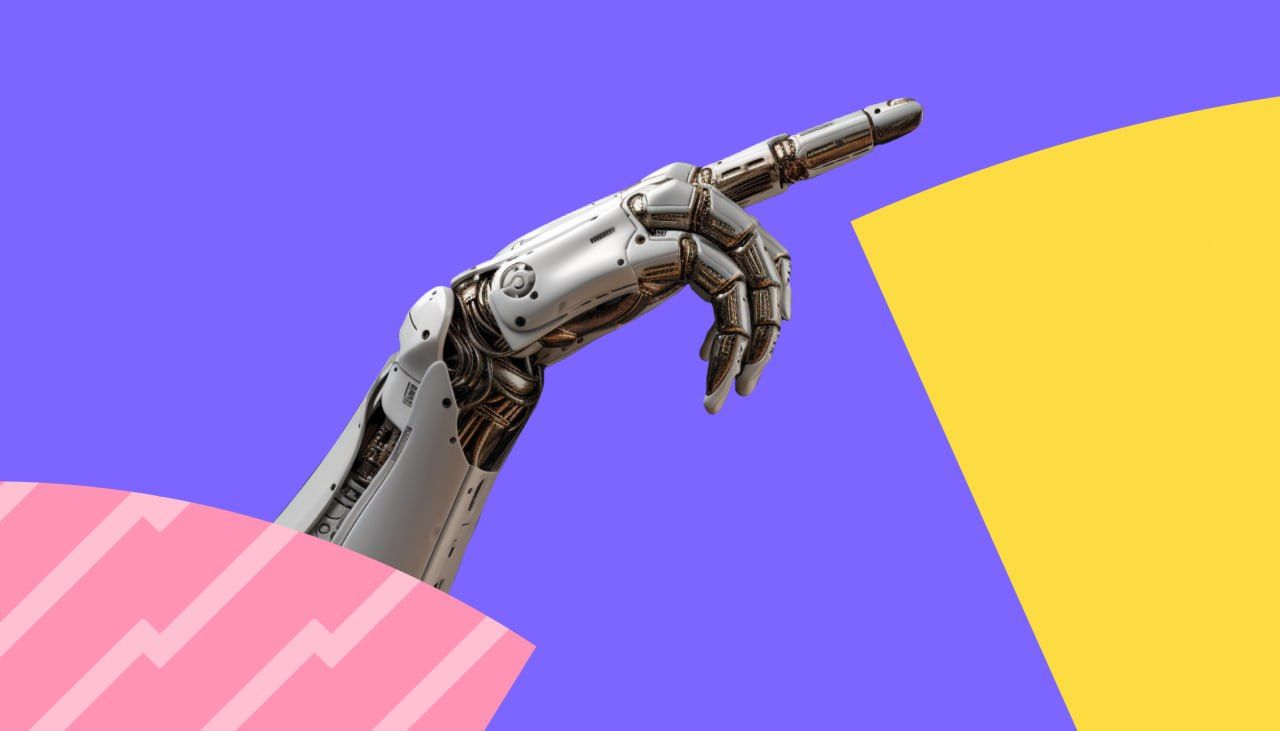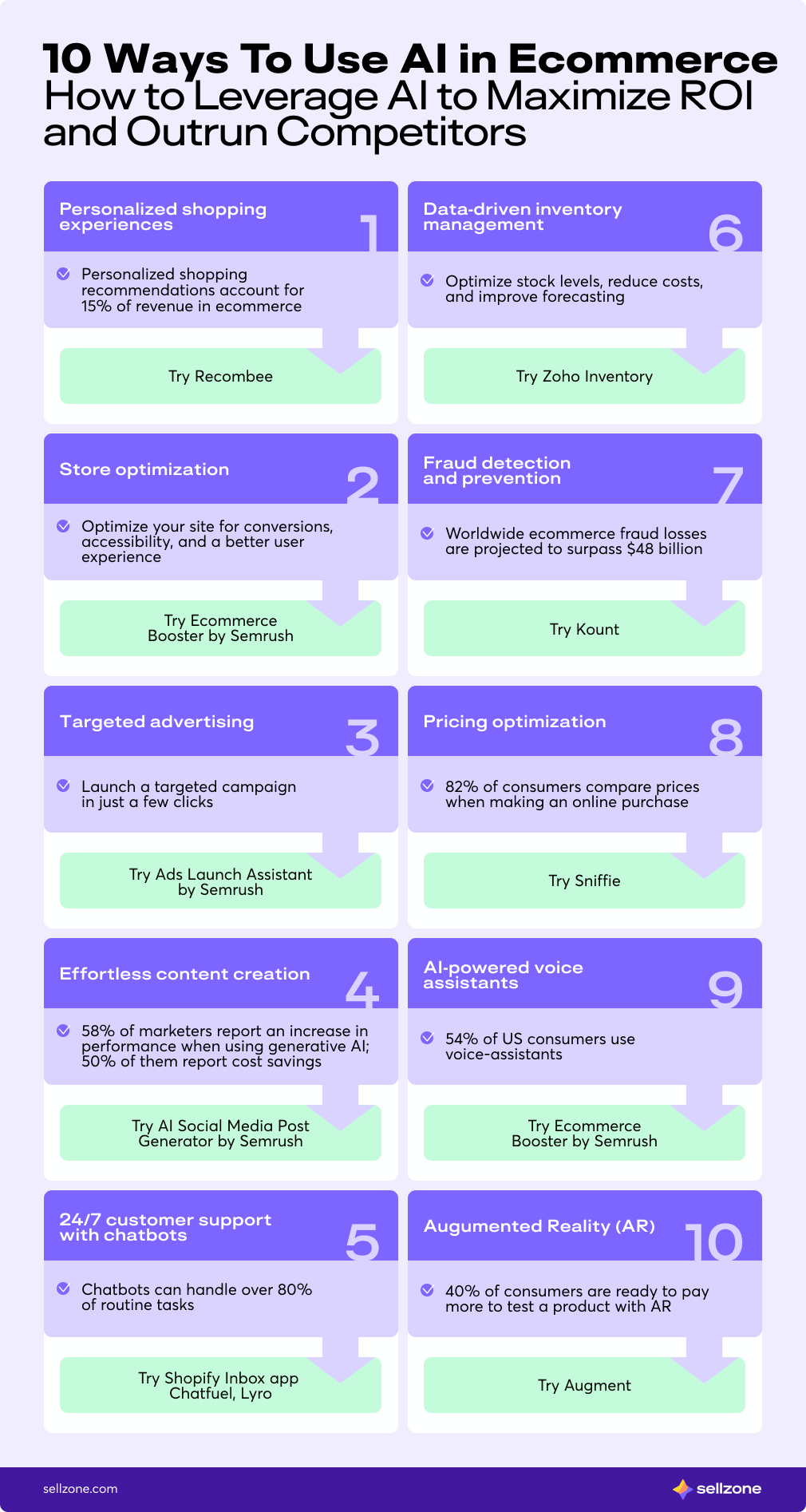11 Ways To Use AI in Ecommerce: How to Leverage AI to Maximize ROI and Outrun Competitors

In today's fiercely competitive ecommerce landscape, staying ahead of the curve is not just a goal; it's a necessity. The rapid evolution of technology has brought forth a powerful ally for online businesses: Artificial Intelligence (AI).
In this post, we'll delve into how this cutting-edge technology can automate, improve, and simplify various facets of your ecommerce operations. Imagine having an AI-driven assistant that not only audits your business processes but also supercharges your social media promotion efforts and optimizes your advertising campaigns. It's not science fiction—it's the reality of today's ecommerce landscape.
AI has emerged as a game-changer, enabling businesses to do more with less, make data-driven decisions, and create unparalleled customer experiences. In this journey through the AI-driven ecommerce landscape, we'll uncover the strategies and tools that can help you survive and thrive in a competitive market.
Hi! This post is brought to you by Sellzone, a blog designed by Semrush to help your ecommerce business grow. Semrush is the online visibility platform trusted by seven million users and 30% of Fortune 500 companies. Take advantage of Semrush's ecommerce tools by entering Semrush AppCenter.
How AI is transforming ecommerce
Companies are expected to spend over $8 billion on AI ecommerce by 2024. This shows that an increasing number of businesses are embracing AI in their daily operations. The ones that do, stand to gain a significant competitive advantage in the market.
AI can help ecommerce companies automate processes, gain access to a vast amount of data that they can use to inform decision making, increase employee productivity and customer satisfaction, and ultimately, improve the bottom line.
For example, generative AI ecommerce tools can help you create engaging product descriptions optimized for search, attractive images, and social media posts that align with your brand voice.
With AI, you can do in minutes what would take hours of research, analysis, and creation. Specifically, 58% of marketers that use generative AI report an increase in performance, and 50% of them report cost savings.
This is only one of the use cases of AI in ecommerce; we’ll see the rest below. The key takeaway is that AI is changing the game. Ecommerce companies that use AI are seeing the benefits. In an increasingly competitive market, companies that neglect AI may struggle to keep pace, let alone outperform their competitors.
The good news is that AI ecommerce solutions are nowadays accessible to every type of business, not just big organizations.

Which is the best AI for an ecommerce website?
There’s a lot that goes into running a successful ecommerce website. From optimizing your product listings to making your pages load quicker and convert better.
That’s why we built Ecommerce Booster. The tool can help you optimize your site for conversions, accessibility, and a better user experience. It audits your site and points out areas for improvement. You also get a step-by-step guide on how to fix the issues it detects.
With the tool’s built-in AI functionalities (AI Boost), you can fix some of those issues in just a few minutes. For example, the tool can generate keyword-optimized and engaging product and meta descriptions for you. You only have to copy and paste the text. With AI Boost features, you can also automatically improve image quality, write alt texts, and remove image backgrounds.
This is not a once-and-done process. Consumer preferences and behaviors change over time. What works today may not be as effective tomorrow. Also, the digital landscape is constantly evolving with new technologies, devices, and platforms. Search engines like Google frequently update their algorithms. You need to continually optimize your website's content and structure to rank well and attract organic traffic.
Continuous optimization ensures your website adapts to these changing trends and customer expectations. You can schedule Ecommerce Booster to audit your site biweekly and send you a report automatically. This helps you stay on top of things and maintain a competitive edge.
Uses of AI in ecommerce for different processes
AI has found many applications in ecommerce. And the companies that adopt AI in different organizational processes are the ones that report the most success.
Specifically, these companies that take a holistic approach to AI adoption are 36% more likely to see its benefits, such as better productivity, decision-making, customer experience, and more.
Here's how AI can help you optimize different ecommerce processes:
Personalized shopping experiences
72% of customers nowadays expect businesses to know them at an individual level. They want them to understand their unique preferences, needs, and behaviors, and to offer products, services, and recommendations that align precisely with their individual tastes.
While personalization is not a new concept, AI has changed the game and customer expectations when it comes to it.
One way AI can help you personalize the shopping experience is by providing your customers with personalized product recommendations. AI algorithms can analyze a customer's past purchases, browsing history, and engagement patterns to suggest products that match their interests.
Here’s how retail brand Zalando is using product recommendations.
These personalized shopping recommendations account for around 15% of revenue in ecommerce.
And it doesn’t stop there. Brands like Zalando are taking personalization one step further, testing new features such as AI-powered fashion assistants. This way, Zalando is leveraging AI to bridge the gap between the online and in-store shopping experience.
You can use tools like Recombee to start offering product recommendations on your site for free.
Targeted advertising
AI can also help you launch targeted campaigns by providing data-driven insights and automating various aspects of the campaign creation and optimization process.
With Semrush’s AI-powered Ads Launch Assistant you can launch a new Google Ads campaign in just a few clicks. The tool will provide you with the keywords to target and ad copy suggestions. You can directly send this information to your Google Ads campaign. And voila, your ad is ready to launch.
New users can get a $500 ad credit to maximize the results of their first Google Ads campaign! (For new Google Ads users only. Terms and conditions apply.)
The tool not only simplifies the process of launching a new campaign, but it also helps you create marketing campaigns that speak directly to specific customer groups, with content and offers that are most relevant to their interests.
Effortless social media content creation
AI tools can also help you with content creation tasks such as generating blog posts, product copy, and visual content as well as translating your content into multiple languages, helping you expand your reach.
Tools like Semrush’s AI Social Media Post Generator can turn the social media content creation process into a breeze. It enables you to automate your social media content creation process by suggesting post ideas, generating captions, and even suggesting images. You’ll have a social media post ready to publish in just a few steps.
While AI-generated content might still require some editing, it can cut off hours of work from your content creation process and ensure that your messaging is targeted.
So, AI does not only help you create content at scale. It also helps you create content that drives results.
24/7 customer support with chatbots
AI-powered chatbots can be a game-changer when it comes to offering 24/7 customer support on your ecommerce store. 32% of customers expect a response from you within half an hour. You can use AI chatbots to provide immediate responses to common customer inquiries, even during the weekend and off-hours.
Not to mention that implementing AI chatbots can be cost-effective compared to hiring and training a large customer support team. Nevertheless, chatbots are not meant to replace the human element of customer support.
Instead, you can use chatbots to handle routine tasks. Specifically, chatbots in ecommerce can handle over 80% of routine tasks, such as tracking orders, checking product availability, or providing store information. This frees us human agents to focus on more complex issues that require human expertise.
There are two types of chatbot solutions you can implement: conversational and rule-based chatbots. Conversational chatbots use AI and Natural Language Processign (NLP) to interact with customers in a way that resembles a human-like conversation. Rule-based chatbots produce specific responses to specific questions, so they are more limited.
If you have a Shopify store, you can use the Shopify Inbox app to integrate a chatbot into your store. For example, by implementing the Shopify Inbox chatbot, Wood Wood Toys managed to close 8 out of 10 sales everytime the customer had the opportunity to use the chat.
Other chatbot solutions include Chatfuel and Lyro.
Data-driven inventory management
AI-driven systems can help optimize your inventory levels by considering variables like lead times, carrying costs, and demand variability.
These tools can forecast demand and alert you when inventory levels for specific products are running low. The timely notification allows you to reorder products promptly, preventing stockouts that can lead to lost sales and customer dissatisfaction.
Also, by optimizing inventory levels, AI helps reduce the costs associated with holding excess stock, including warehousing and storage expenses.
Zoho Inventory is a popular AI inventory management tools that integrates with most ecommerce platforms.
Fraud detection and prevention
Ecommerce platforms are susceptible to various forms of fraud, including payment fraud and account takeovers. Worldwide ecommerce fraud losses are projected to surpass $48 billion in 2023.
AI algorithms can analyze transaction data and user behavior patterns to detect anomalies and potential fraudulent activities in real-time. This includes unusual purchase amounts, shipping addresses, or payment methods. When suspicious activities are identified, the system can trigger security measures or notify the appropriate personnel. This allows immediate action to be taken to prevent fraudulent transactions.
There are many tools in the market that offer fraud detection and prevention for ecommerce. Kount is a well-know AI tool that caters to ecommere businesses of all sizes.
By employing AI-driven fraud detection and prevention systems, your ecommerce store can not only reduce the risk of fraudulent transactions but also minimize false positives, ensuring that legitimate transactions aren't unnecessarily blocked.
Pricing optimization
82% of consumers compare prices when making an online purchase. So you need to be priced competitively.
AI algorithms can analyze market demand, competitor prices, and other factors in real-time to adjust your prices accordingly. This way you remain competitive in the market.
AI can also help you run A/B tests to determine the most effective pricing strategy.
And not only are you priced competitively, but AI tools can help you increase your margins. For example, by ensuring you’re not leaving money on the table.
Sniffie is one such tool that uses AI to help you optimize your prices in real time.
Store optimization for better conversion
With an AI tool like Ecommerce Booster, you can optimize your store's performance in several areas, from increasing conversions to improving your site speed and accessibility.
The tool conducts an expert-level audit of your product pages, creates an action plan for increasing conversions, and offers AI tools to generate descriptions, upscale images, and create alt tags.
This way your audience can find you easier. And when they do, they will have a pleasant shopping experience and convert better.
AI-powered voice search
Over half of US consumers (54%) is using voice assistant technologies as part of their retail shopping journey.
This can take the form of consumers asking Alexa or Siri “how much does the new iPhone cost?”.
As an ecommerce business owner, you can tap into this trend by optimizing your site for voice search. Here are a few tips to get started:
- Create content that’s conversational in tone. Voice searches tend to be longer and question-based.
- Focus on long-tail keywords that mimic natural speech patterns.
- Try to get your content featured as a snippet.
- Optimize for local SEO search.
- Make sure your site is mobile-friendly.
- Optimize your website’s speed for a better user experience.
The majority of the tips revolve around optimizing your site performance. As we’ve seen so far, Ecommerce Booster is the AI tool that can help you with that. You can run a site audit and see which areas need improvement.
Augmented Reality (AR)
Augmented Reality (AR) is another area through which AI is transforming ecommerce.
AR allows customers to visually try on products, such as clothing, accessories, or even furniture. They can see how items would look on themselves or in their living spaces before making a purchase. Such as in this IKEA commercial.
Seems pretty cool, right? By creating an immersive experience, AR can help you boost conversions and lower return rates.
What’s more, 40% of consumers are ready to pay more to test a product with AR.
And it’s not that complicated to implement. For instance, you can use an app like Augment to easily create 3D versions of your product.
FAQ
Why AI is the future of ecommerce
AI is transforming the way businesses engage with customers and structure their operations. AI's ability to analyze vast amounts of data and automate processes positions it as a game-changer. With the help of AI, busineses can deliver personalized shopping experiences at scale, while staying competitive in a rapidly evolving market.
How AI is used in ecommerce
AI in ecommerce is used to optimize a multitude of processes. One key application is personalized product recommendations, where AI algorithms analyze a user's browsing and purchase history to suggest relevant products. AI-driven chatbots provide 24/7 customer support. AI is also employed in inventory management, fraud detection, and overall ecommerce website optimization.
What is the best use of AI in ecommerce?
The best use of AI in ecommerce is optimizing your product information and visuals, ultimately driving higher conversion rates through refined product listings. AI can analyze and improve product descriptions, images, and your overall site performance. This enhances the customer experience and makes your product pages sell better.
What are the challenges of AI in ecommerce?
Challenges of AI in ecommerce revolve around data quality, privacy concerns, and algorithm biases. AI relies heavily on accurate and clean data. Privacy concerns arise when collecting and using customer data for personalized experiences, requiring you to take robust data protection measures. Algorithm bias is another issue, as AI recommendation systems may inadvertently reinforce stereotypes or overlook certain customer segments.

